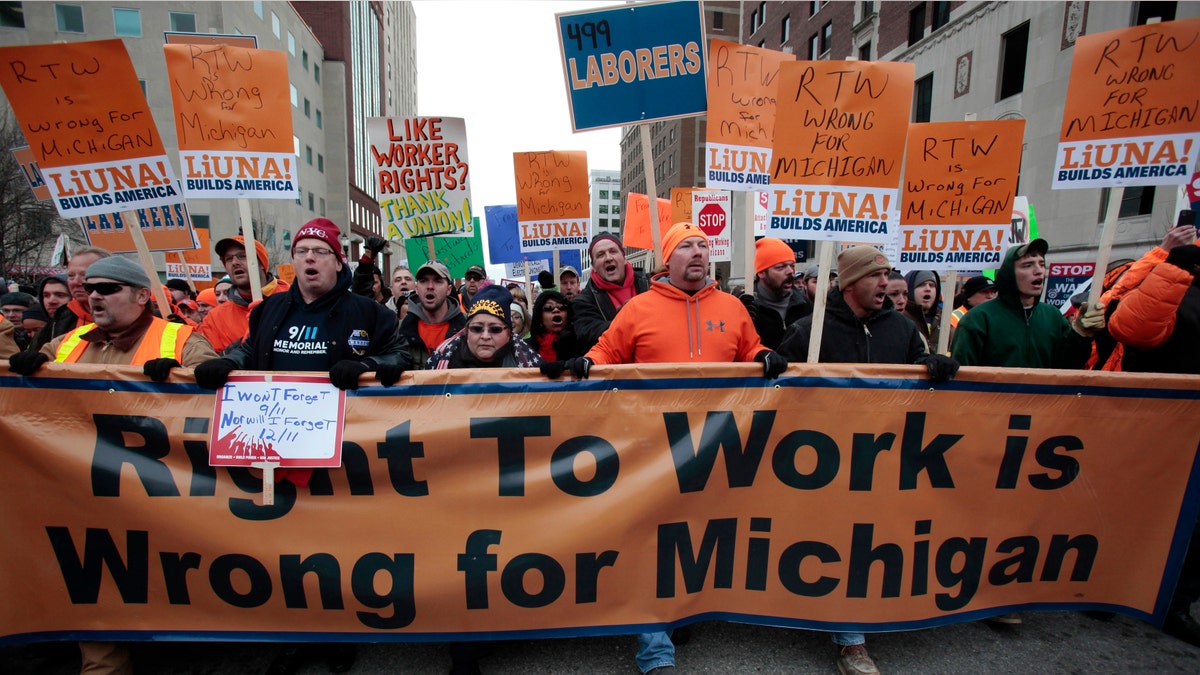
FILE: Dec. 11, 2012: Union members and supporters march to the Michigan State Capitol to protest against right-to-work legislation, in Lansing, Mich. (REUTERS)
With Labor Day marking the traditional time for Americans to take stock in the successes and failures of the country’s centuries-long labor movement, union membership remains steady but only a fraction of what it was during its peak in the 1950s.
The number of U.S. wage-earners also belonging to a union in 2012 and 2013 is 14.5 million, or 11 percent of the workforce, according to the most recent figures from the Bureau of Labor Statistics, compared to roughly 30 percent 64 years ago.
Union membership for public-sector unions -- whose rolls include such government employees as teachers, police officers and firefighters -- remains relatively high at 35 percent. However, the number of private-sector employees enrolling in unions, now at 6.7 percent, has resulted in the overall decline in membership.
Much of the private-sector drop can be attributed to the steady decline in U.S. manufacturing, with many goods and products now being built by overseas workers at a lesser cost.
Meanwhile, public sector unions are facing increasing pressure in the United States from conservative lawmakers who have argued that their collective-bargaining agreements are hurting the economy.
They and other union critics say such agreements drive up wages that in turn causes inflation, have resulted in pension systems threatening to bankrupt state and local governments and have kept bad teachers from getting fired.
Critics also contend that union influences have resulted in steadily declining paychecks, pointing out that wages remain flat while corporate profits soar, five years after the Great Recession.
President Obama on Monday will be in Milwaukee -- a state that became the focal point in the fights over the collective bargaining deals of public employees -- to talk about the country’s steady economic growth since the recession, while remaining mindful about the low wages and lingering unemployment amid big corporate and investor profits.
Vice President Joe Biden took a similar Labor Day message to Detroit, telling hundreds of union members that they deserve a "fair share" of any improvement in corporate profits.
At about the same time, the conservative think tank Freedom Foundation was recognized Labor Day by making workers go to the office and declaring it “Right-to-Work Day” -- a reference to legislation backed by conservative lawmakers across the country to stop agreements in which workers have to join unions or pay dues to get or keep a job.
“If you're going to pay tribute to something, why not the freedom to keep your job even when you choose not to join a union?” Tom McCabe, president of the Washington state-based foundation, said Friday. “It would be hypocritical to honor the labor movement with a holiday when we spend the rest of the year working to curb its excesses."
On Sunday, Mary Kay Henry, president of the Service Employees International Union, called this Labor Day a "pivotal time to take stock of where our families, our economy and our democracy are heading."
Henry, who flew on Air Force One with Obama to Milwaukee on Monday, argued in a recent op-ed for The Nation that collective bargaining played a key role in helping roughly 6.7 million fast-food workers get higher pay over the past two years.











































